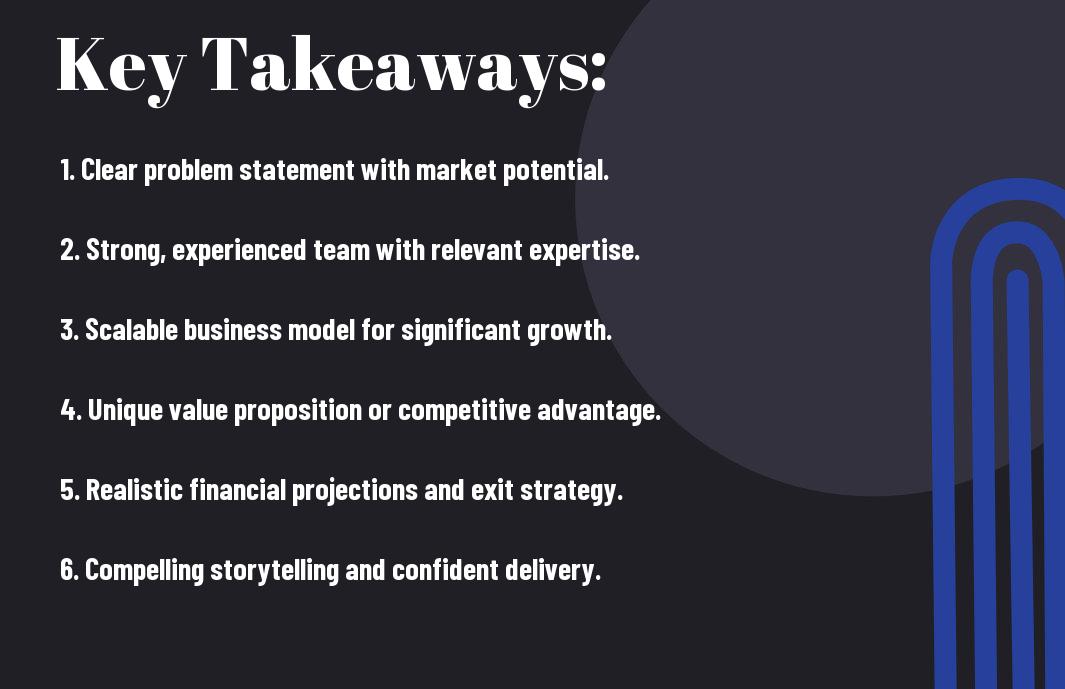There’s no denying that understanding what investors are looking for in a pitch is crucial for entrepreneurs seeking funding. A successful pitch can attract capital to help scale a business, but a poorly crafted one can turn investors away. To stand out and secure funding, it’s crucial to grasp the investor mindset. In this blog post, we will explore into the key factors that investors consider when evaluating a pitch, including market opportunity, competitive advantage, team strength, and financial projections. By gaining insights into what makes a winning pitch, entrepreneurs can position themselves for success and secure the funding needed to take their business to the next level.

Key Components of a Powerful Pitch
Clarity of Idea and Vision
Vision is the cornerstone of any successful pitch. Investors want to see a clear and compelling vision of the future that your idea will lead to. Your vision should be innovative, ambitious, and backed by a solid understanding of the problem you are solving. It should inspire confidence that you have a clear roadmap for how you will achieve your goals.
Understanding the Market and Competition
Clarity on the market and competition is crucial. Investors need to know that you have a strong grasp of the market landscape, including key trends, customer needs, and competitors. Highlighting what sets your product or service apart from competitors is crucial. A deep understanding of the market and competition shows investors that you have done your homework and are well-prepared to navigate challenges.
The Financials – What Investors Need to Know
You, as an entrepreneur seeking investment for your venture, must prepare to present a clear picture of your financials to potential investors. Understanding the key aspects of what investors look for in a pitch is crucial to securing funding. For more insights on this topic, you can visit What Investors Look For In A Pitch.
Revenue Models and Projections
Revenue models and projections are vital components that investors want to see in your pitch. Clearly outline how your business generates revenue, whether through sales, subscriptions, or other means. Present realistic and achievable financial projections that demonstrate the growth potential of your venture. Investors need to understand how your business will make money and sustain profitability in the long run.
Risk Assessment and Mitigation Strategies
Know the risks involved in your business and be prepared to address them proactively. Investors need to see that you have identified potential risks and have developed strategies to mitigate them. This shows that you have a thorough understanding of the challenges your business may face and are prepared to handle them effectively. Plus, highlighting your risk management capabilities can instill confidence in investors and set you apart from other entrepreneurs.
The Team Behind the Idea
Leadership and Experience
Now, when investors evaluate a startup, one of the key factors they look at is the leadership team behind the idea. Investors want to see a team with a diverse skill set, strong leadership qualities, and relevant experience in the industry. A solid team inspires confidence in investors that the startup has what it takes to succeed and weather the challenges ahead.
The Ability to Execute and Pivot
Now, leadership plays a critical role in the ability to execute and pivot. Startups often face unexpected challenges and opportunities that require them to adapt quickly. The team’s ability to pivot, make tough decisions, and execute on their plans is crucial for success. Investors want to see a team that is agile, creative, and resilient, ready to navigate the uncertainties of the startup journey.
The team’s adaptability and agility are imperative as they encounter various obstacles and market shifts. Investors value a team that can pivot strategically when needed, demonstrating the flexibility required to seize new opportunities and overcome setbacks. By showcasing their ability to execute and pivot effectively, the team can instill confidence in investors and set themselves apart in a competitive landscape.

Presenting the Pitch – Tips and Techniques
Not every pitch is created equal. When presenting your pitch to investors, it’s crucial to highlight the key elements that will capture their attention and set you apart from the competition. Start by outlining your unique selling proposition and explaining how your product or service addresses a specific market need. Utilize visuals, such as slides or product demos, to enhance your presentation and make it more engaging. Practice your delivery to ensure you come across as confident and knowledgeable. Do not forget, first impressions matter, so be sure to dress professionally and maintain a professional demeanor throughout the pitch.
Communication and Persuasion Skills
Communication is key when delivering a pitch to investors. Your ability to clearly articulate your ideas, convey your passion for the project, and address any questions or concerns will go a long way in convincing investors to back your venture. Practice active listening and be open to feedback to improve your communication skills further.
The Importance of Feedback and Adaptability
Feedback is crucial in the pitching process. Investors will provide valuable insights that can help you refine your pitch and business model. Adaptability is key; be willing to make changes based on the feedback you receive to increase your chances of securing investment. This iterative process demonstrates to investors that you are receptive to input and committed to improving your business.
Summing up
Following this exploration of the investor mindset and what investors look for in a pitch, it is evident that preparation, clear communication, a compelling story, a solid business model, and a realistic valuation are key elements that can make or break a pitch. Understanding the perspective of investors and tailoring your pitch to align with their priorities can significantly increase your chances of securing funding for your venture. Recall, investors are looking for not just a great idea, but a well-thought-out plan with a strong potential for return on investment. By focusing on these crucial aspects, you can present a compelling case that resonates with investors and sets you on the path to success.
FAQ
Q: What is the investor mindset when looking at a pitch?
A: Investors typically look for key components in a pitch that demonstrate the potential for a high return on investment. These may include a clear problem statement, a unique solution, a sizable market opportunity, a solid business model, a strong team, and a clear path to profitability.
Q: How can entrepreneurs tailor their pitch to appeal to investors?
A: Entrepreneurs should focus on presenting a well-thought-out and concise pitch that highlights the scalability and profitability of their business. It’s important to demonstrate a deep understanding of the market, showcase a strong value proposition, and establish credibility through data and metrics.
Q: What are some common mistakes entrepreneurs make when pitching to investors?
A: Common mistakes include lack of preparation, failing to address key questions or objections, being overly optimistic with projections, neglecting to highlight the competitive landscape, and presenting a product-centric pitch rather than focusing on the business opportunity. It’s vital for entrepreneurs to anticipate investor concerns and be transparent about potential risks.
